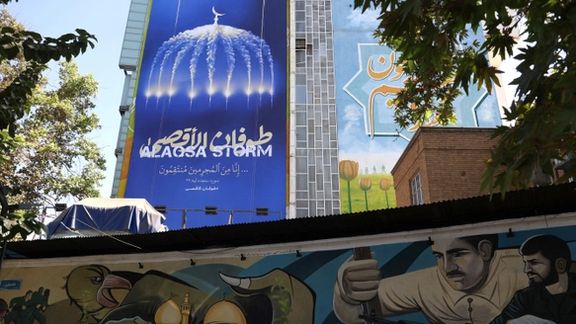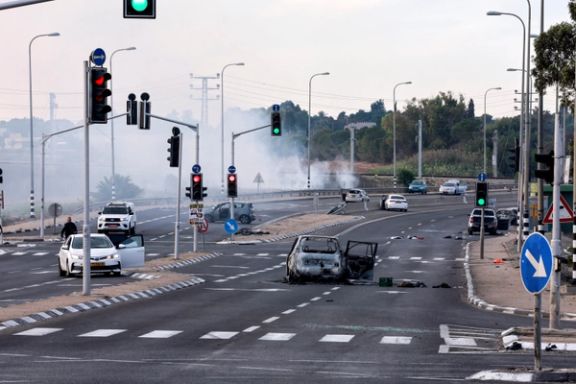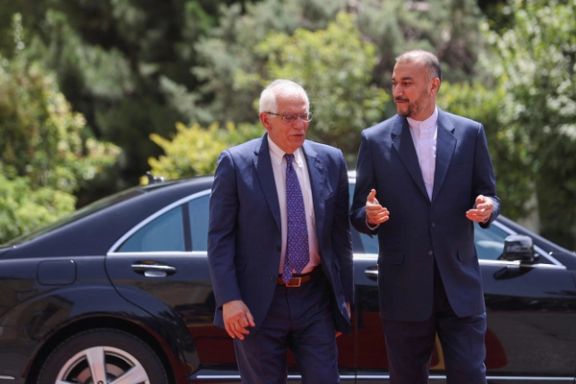Israeli Shells South Lebanon After Hezbollah Rocket Fire

Fresh clashes between Israel and the Iran-backed Lebanese Hezbollah along the shared border on Wednesday signified the danger of a widening war in the region.

Fresh clashes between Israel and the Iran-backed Lebanese Hezbollah along the shared border on Wednesday signified the danger of a widening war in the region.
Israeli shelling hit southern Lebanese towns in response to a fresh rocket attack by powerful armed group Hezbollah, as cross-border violence extended into a fourth day.
Hezbollah said it had fired precision missiles at an Israeli position in response to the killing of its members in Israeli shelling earlier this week, pledging "decisive" responses to attacks on Lebanese territory, especially deadly ones.
The Israeli military said it was attacking Lebanon after one of its northern positions near the Israeli town of Arab al-Aramshe was targeted with anti-tank fire on Wednesday.
It did not immediately provide details on casualties.
A Lebanese security source said Hezbollah fired two precision missiles into Israel, which the group considers its sworn enemy.
Residents of the southern Lebanese town of Rmeish said Israeli shelling hit nearby. A security source told Reuters that Israeli artillery rounds were hitting the rocket launch point around Dhayra, across from Arab al-Aramshe.
Local Lebanese television station al-Jadeed broadcast images of plumes of white smoke billowing out of a wooded region near some homes and farmland in Dhayra.
Hezbollah and Palestinian faction Hamas both claimed attacks from Lebanon on Tuesday. Lebanon's Hezbollah fired a guided missile at an Israeli tank, posting a video of its destruction, and Hamas said it launched a salvo of rockets into Israel.
The outbreak of violence along the border came after Hamas launched a deadly attack against Israel at the weekend, with Israel unleashing a bombing campaign against Gaza.

The US considers Iran ‘at least complicit’ in Hamas attack on Israel, the State Department said Tuesday, after insisting it had no evidence of Tehran's direct involvement.
Spokesperson Matthew Miller told reporters the Biden administration is now trying to establish if the regime in Iran or elements within the system contributed to the planning of the attack by Hamas militants.
“Iran likely knew that Hamas was planning operations against Israel, but without the precise timing or scope of what occurred,” Miller told journalists at the State Department’s press briefing.
The Islamic Republic has been supporting Hamas for many years. It’s not yet established, however, how far the IRGC was involved in Hamas’ most recent operation.
Ghazi Hamad, a Hamas spokesman, told the BBC that the group had direct backing for the attack on Israel from Iran. A report in Wall Street Journal suggested the same, quoting unnamed sources from Hamas and Hezbollah.
Iran has denied involvement in the operation, which has killed more than 1,200 Israelis. “They say the Islamic Iran was behind this move… they are wrong… Palestinians did it themselves,” said Supreme Leader Ali Khamanei Tuesday.
On numerous occasions before, he has boasted that his regime has had a hand in confrontations against Israel (like the 33-day War with Hezbollah in 2006) and that Iran will keep on helping “any group that fights the Zionist regime.”
The extent of the regime’s involvement in the Hamas attack, if and when it’s established, would likely inform the nature of the response from Israel and the United States. Many in Washington are already pushing for retaliatory measures, including re-freezing the $6 billion of Iran’s old revenue that was unblocked last month to secure the release of five Iranian-Americans held hostage in Tehran.
US Senators have written to President Biden, demanding that access to the money (currently held in a Qatari bank) be denied.
“The State Department should immediately rescind the waivers that allowed Iranian funds converted and moved to more accessible bank accounts,” reads the lawmakers’ letter to Biden, “as well as work with US ally Qatar to immediately freeze the accounts containing these funds.”
The signatories believe that the $6 billion, even if used solely and entirely for humanitarian purposes, would free up other funds in Iran to be used on other, ‘malign’ activities.
Responding to this argument, the State Department Spokesperson said he could confirm that “not a cent” of the $6 billion has been spent at this point. “And we have the ability to freeze it at any time,” Miller concluded.
Hamas’ attack on Israel has enraged those who believe they had warned the Biden administration of the consequences of its lenient approach to the regime in Iran.
“Concessions to the ayatollahs have made them believe America will not stand up for itself or our allies,” Senator Tom Cotton told Fox News Tuesday, “President Biden must reverse his policies that have emboldened Iran and its terrorist proxies.”
It seems to be an attack line the Republicans would not abandon soon.
“Make no mistake— Hamas's genocidal violence was partly enabled by Biden unfreezing billions of dollars to Iran,” Senator Ted Cruz said Tuesday.
Tim Scott, another Republican Senator who is a ranking member of the Senate Committee on Banking, called for a hearing and an investigation into the ‘release of the $6 billion to Iran’.
“We should be signaling strength - not leniency - when it comes to Iran,” Senator Scott said in a statement Tuesday, “that’s why now is the time to pass my Solidify Iran Sanctions Act and send the message that Iran should not expect U.S. sanctions to lapse.”

Two of Iran’s heavily armed proxy groups in the region have threatened to target US interests if Washington intervenes to support Israel in its conflict with Hamas.
The Houthi Movement in Yemen and a powerful Iraqi militia group both issued identical statements, which can be a sign that Tehran is willing to leverage its loyal proxies to flex its muscle against the United States.
The comments come amid strong support by the United States for Israel's response to the attacks and a US pledge to rapidly provide additional munitions to Israel and deploy a carrier strike group to the Eastern Mediterranean.
In Yemen, the leader of the powerful Houthi Movement warned on Tuesday that the group would respond to any US intervention in Gaza with drones, missiles and other military options.
He said the group was ready to coordinate intervention with other members of the so-called "Axis of Resistance" which encompasses Iranian-backed Shiite Muslim factions in Iraq and Lebanon's Hezbollah group, which has already entered the fray.
The remarks came after the top US general late Monday warned Iran not to get involved in the crisis in Israel and said he did not want the conflict to the broaden, as Lebanese Hezbollah fired rockets onto northern Israel.
The White House earlier on Monday said that Iran was complicit even though the United States has no intelligence or evidence that points to Iran's direct participation in attacks in Israel by Palestinian Islamist group Hamas.
Asked what his message for Iran was, General Charles Q. Brown, the chairman of the Joint Chiefs of Staff, said: "Not to get involved."
Later on Tuesday, President Joe Biden repeated the warning in an address to the nation. "So, in this moment, we must be crystal clear. We stand with Israel. Let me say again to any country, any organization, anyone thinking of taking advantage of this situation, I have one word. Don't. Don't!"
In Iraq, Hadi Al-Amiri, a powerful Iraqi politician close to Iran and a key figure in the cross-party alliance backing the Baghdad government, also threatened to target American assets, in comments made during a tribal gathering in the capital.
"If they intervene, we will intervene...If the Americans intervened openly in this conflict..., we will consider all American targets legitimate..., and we will not hesitate to target it," Al-Amiri said on Monday.
He leads the Badr Organization, a Shi’ite political group supported by Iran that comprises a large part of Iraq's Popular Mobilization Forces (PMF), the state paramilitary organization that contains many Iran-backed factions.
If the US forces intervene in the operation al-Aqsa Storm – the codename for the Hamas attack, “we will target the American bases” as well as Israeli positions, said Abu Hussein al-Hamidawi, the secretary-general of Kataib Hezbollah, a radical Iraqi Shiite paramilitary group and part of the PMF.
The PMF has voiced its "unequivocal support" for the Palestinian factions fighting Israel and the Iraqi government has said the Palestinian operations were a natural outcome of what it calls "oppressive" policies by Israel.
In past years, Iranian-backed militias in Iraq regularly targeted US forces in Iraq and the US embassy in Baghdad with rockets, though such attacks have abated under a truce in place since last year, as Iraq enjoys a period of relative calm.
The United States currently has 2,500 troops in Iraq - and an additional 900 in Syria - on a mission to advise and assist local forces in combating Islamic State, who in 2014 seized swathes of territory in both countries.

A senior Hamas official said if Gaza were subjected to “a war of annihilation,” allies such as Iran and Lebanese Hezbollah "would join the battle."
Ali Barakeh, a member of Hamas' exiled leadership, shared the remarks during an interview with The Associated Press at his office in Beirut.
The statement was made amid Israel's bombardment of Gaza and its declaration of a complete blockade of the Hamas-controlled territory following a surprise attack Saturday that caught Israel's military and intelligence services completely off guard. It has resulted in the worst military bombardment of the Jewish state in 50 years.
Hundreds of Hamas militants entered by land, sea and air, resulting in the massacre of hundreds of soldiers and civilians, with dozens more taken captive, including women, children and the infirm.
Barakeh claimed that the attack had been planned by approximately six senior Hamas commanders in Gaza and that even their closest allies were unaware of the timing beforehand.
He refuted reports suggesting that Iranian security officials had helped orchestrate the attack or had given approval during a meeting in Beirut the previous week.
The development came after a joint statement issued on Monday by the United States and four European allies, where they reaffirmed their support for Israel. The leaders of the United States, France, Germany, Italy, and Britain emphasized their solidarity with Israel while condemning Hamas.
“We make clear that the terrorist actions of Hamas have no justification, no legitimacy, and must be universally condemned. There is never any justification for terrorism,” read the statement.

President Joe Biden condemned Hamas terror attack on Israel that killed over 1,000 people and vowed “swift, decisive and overwhelming response.”
In an address to the nation from the White House, he also expressed concerns about the Americans being held hostage by the Iranian-backed Islamist group as well as the death of at least 11 Americans in the multi-thronged invasion on October 7.
National Security Advisor Jake Sullivan said, “We believe that there are 20 or more Americans who at this point are missing, but I want to underscore and stress that does not mean necessarily that there are 20 or more American hostages. Just that is the number who are currently unaccounted for."
In his deeply emotional speech, Biden emphasized that the US has Israel’s back, saying, "This is an act of sheer evil.”
"There are moments in this life and I mean this literally when the pure unadulterated evil is unleashed on this world. The people of Israel lived through one such moment this weekend," he stated.
"So in this moment, we must be crystal clear. We stand with Israel. Let me say again to any country, any organization, anyone thinking of taking advantage of this situation, I have one word. Don't. Don't!"

Biden's warning can be seen a reminder to the Iranian regime and its most powerful proxy force, the Lebanese Hezbollah, which again traded fire with Israel on Tuesday, as the fighting in and around Gaza was continuing. Earlier, the Chairman of the US joint chiefs, Gen, Charles Brown warned Iran not to get involved in the conflict.
Biden, who spoke after his third phone call in four days with Israeli Prime Minister Benjamin Netanyahu, highlighted in his remarks the US military assistance being sent to help Israel in its fight.
Biden also offered an overview of the actions the United States is taking with allies around the world to support Israel.
Biden also offered support for American Jews and said they should be allowed to worship in peace in the United States. Biden said last month that antisemitism in the United States had risen to record levels.
He added that US law enforcement agencies were taking steps to disrupt any domestic threat that may emerge after Hamas' weekend attack. The FBI said earlier it was "closely monitoring unfolding events" but added it "does not have specific and credible intelligence indicating a threat to the United States stemming from the Hamas attacks in Israel."
The United States does not plan to put American military forces on the ground, White House national security spokesperson John Kirby told reporters. Israel has called up an unprecedented 300,000 of its own reservists.
Israel's embassy in Washington said the death toll from Hamas' weekend attacks had surpassed 1,000, dwarfing all modern Islamist attacks on the West since the September 11, 2001, attacks on the United States.
Earlier, Israel’s military announced that the country’s border is under control after hours of fighting and airstrikes Tuesday. Brig. Gen. Dan Goldfuss of the 98th Division said the military is now “moving into the offensive … to change the reality within Gaza to prevent such a thing from happening again.”

Josep Borrell, the EU's foreign policy chief, reaffirmed his condemnation of the "brutal attacks" on Israel in a phone conversation with the Iranian Foreign Minister.
“Nothing can justify such despicable acts of terror and nothing can justify supporting it,” Borrell said in a message on Tuesday.
However, Iranian Foreign Minister Hossein Amir-Abdollahian claimed that during the phone call he described the attacks as “a natural legitimate reaction to the radical criminal acts of the Zionist Regime and a clear outcome of Netanyahu extremism against the motherland of the Palestinian nation.”
Meanwhile, French President Emmanuel Macron stated on Tuesday that “it’s likely” that Iran assisted Hamas in carrying out the deadly terrorist attack on Israel. However, he noted that Western allies currently lack definitive proof of Iran's involvement.
Macron's comments followed several news reports suggesting Tehran's active role in launching the violent incursion into Israeli territory, resulting in the deaths of over 1,000 civilians.
On Tuesday, Iran’s Supreme Leader Ali Khamenei reiterated Tehran’s support for the militant group’s actions, which he said caused Israel to suffer “an irreparable defeat.”
“This devastating earthquake has managed to destroy some of the key structures of the oppressive regime's governance, the reconstruction of which is not easily achievable,” he said.
Iran promptly congratulated Hamas following its surprise attack on Israel and expressed support for “anti-Zionist resistance in the region.”
Speaking alongside German Chancellor Olaf Scholz at a Franco-German summit in Hamburg, Macron reiterated their strong condemnation of Iran's celebration of the attack.